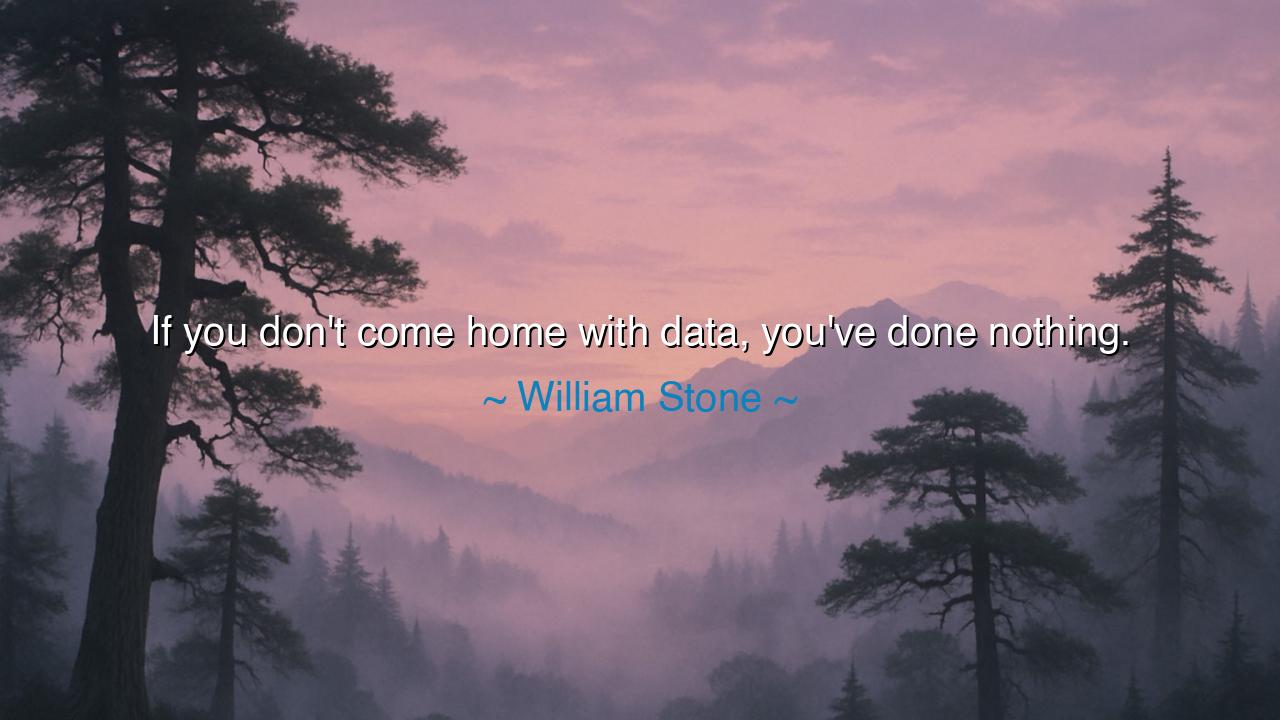
If you don't come home with data, you've done nothing.






In the resolute words of William Stone, the daring explorer and engineer, we find a creed for all who seek knowledge through action: “If you don’t come home with data, you’ve done nothing.” Though brief, this declaration rings with the force of ancient wisdom — the call of those who brave the unknown not for glory, but for truth. Stone’s words, born from the depths of exploration, echo the eternal lesson that discovery without evidence, ambition without understanding, and effort without result are but illusions of progress. He speaks not only to the scientist, but to every soul who ventures forth into challenge — that one’s journey, however arduous, must return with fruit, or it has no meaning.
To grasp the weight of his statement, we must first understand who William Stone is and the world from which his words arise. A modern-day Odysseus of the underworld, Stone is a cave diver and explorer who has descended into the deepest caverns of Earth — the silent, alien realms where no sunlight dwells and where death is a single breath away. His expeditions, carried out in the blackened arteries of the planet, demand precision, endurance, and purpose. When he says, “If you don’t come home with data,” he is not speaking metaphorically alone; he means it literally. In those depths, where resources and lives are at stake, curiosity without record is folly. Every descent must bring back knowledge, every danger faced must yield proof, every venture must serve the light of human understanding. Otherwise, the peril and the sacrifice dissolve into vanity.
Yet beyond the world of exploration, Stone’s words are a parable for all endeavors of life. In the ancient days, the philosophers of Athens taught that action without reflection is blindness, and reflection without evidence is emptiness. The Stoics would have called this the discipline of truth-seeking — the virtue of doing nothing in vain. The Egyptians, who mapped the stars and measured the Nile, believed that each act of discovery was an offering to the gods, but only if it was accompanied by record and reason. Thus, William Stone’s modern cry for “data” is but the continuation of a lineage as old as civilization itself — the human insistence that every expedition into the unknown must return bearing something of worth.
Consider the tale of Captain Robert Falcon Scott, who led his men to the South Pole in 1912. Though he perished in the frozen wasteland, he did not die empty-handed. His team’s final act before death was to preserve their journals, their meteorological logs, their records of discovery. They were found months later, encased in ice, the data still intact. From their sacrifice came the scientific understanding of Antarctica’s harsh climate — knowledge that lives beyond their mortal failure. Though they never came home themselves, they came home with data, and thus they achieved what Stone demands: to make one’s suffering meaningful through the gift of insight.
The origin of Stone’s quote lies in the philosophy of exploration itself — the union of courage and discipline. It rejects the vanity of adventure for adventure’s sake and exalts the pursuit of understanding as the highest form of heroism. To journey without bringing back truth is to wander in circles; to risk without purpose is to court oblivion. The data, in his words, becomes more than numbers — it is the crystallized memory of struggle, the proof of humanity’s upward climb. It is the torch that turns chaos into comprehension.
Yet Stone’s lesson extends beyond science and exploration. In every realm — whether art, study, or personal growth — we too must “come home with data.” We must emerge from our experiences with insight, from our failures with lessons, from our hardships with wisdom. To live blindly, without reflection or record, is to drift through life as though asleep. The ancients knew that the soul, like the explorer, must return from every trial bearing treasures of understanding. Otherwise, suffering is wasted, and time becomes ash.
Let this be the teaching: effort without learning is emptiness. To live fully is to observe, to record, to transform experience into knowledge. Each day is an expedition — into love, into failure, into the depths of the self. Do not let it pass without bringing something back. Write, remember, reflect. Collect the data of your own life — the truths that pain has taught you, the insights that wonder has revealed. For those who return home with understanding are the true explorers, the ones who enlarge not only the world but the soul of humanity itself.
Action to take: be an explorer of your own experience. Keep record of what you learn, whether through journaling, creation, or sharing. Approach every challenge not merely to survive it, but to harvest truth from it. For as William Stone reminds us, it is not enough to descend into the unknown — one must also bring back light. Only then can we say that our journey, however perilous, has not been in vain.






AAdministratorAdministrator
Welcome, honored guests. Please leave a comment, we will respond soon